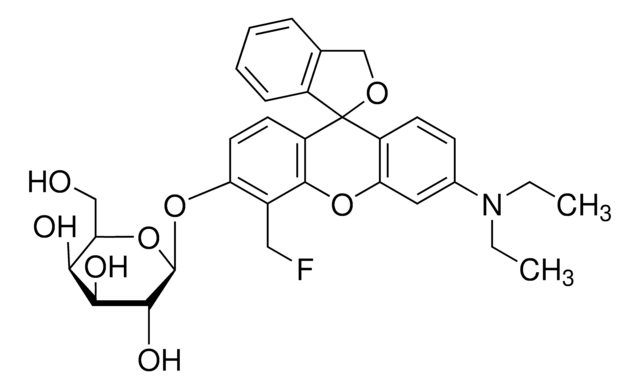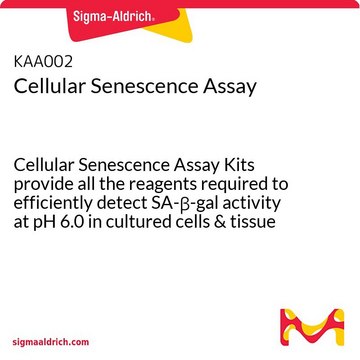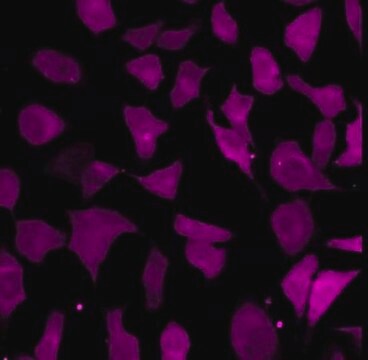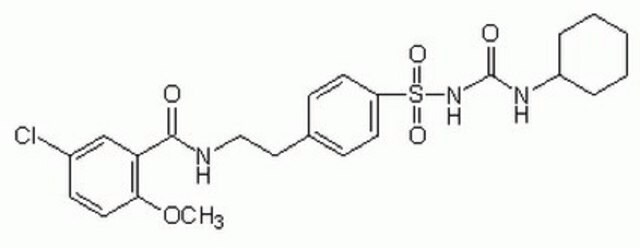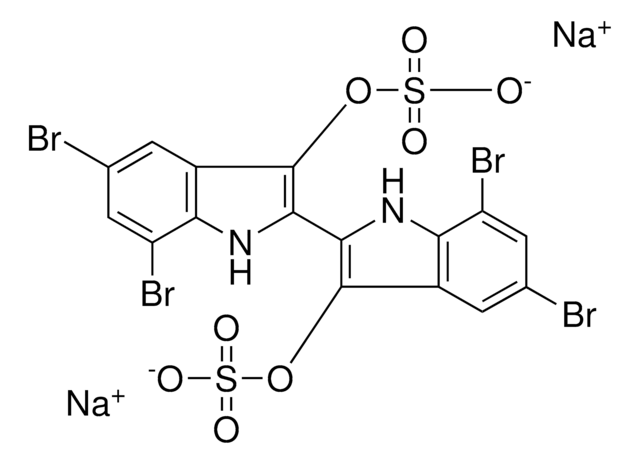SCT024
BioTracker 543 Yellow β-Gal Dye
Live cell imaging dye for β-galactosidase (β-gal) used to detect LacZ reporter gene expression and cellular senescence (SA-β-gal).
Sinónimos:
Live cell imaging probe
Iniciar sesiónpara Ver la Fijación de precios por contrato y de la organización
About This Item
Código UNSPSC:
12352207
eCl@ss:
32161000
NACRES:
NA.47
Productos recomendados
técnicas
cell based assay: suitable
método de detección
fluorometric
Condiciones de envío
ambient
Descripción general
β-galactosidase, also called beta-gal or β-gal, is a glycoside hydrolase enzyme that catalyzes the hydrolysis of β-galactosides into monosaccharides through the breaking of a glycosidic bond. β-gal is commonly used in molecular biology as a reporter marker to monitor gene expression using the chromogenic X-Gal. β-gal has also been used to measure cellular senescence (SA-β-gal).
The BioTracker 543 Yellow β-Gal Dye is a fluorescent probe for the detection of β-galactosidase in living cells. It can be applied to fluorescent imaging and selection of cell and tissue transfected with lacZ along as a measurement of cellular senescence. Other applications include gene analysis by fluorescent imaging, monitoring transfection efficiency, and the study of gene promoter or enhancer elements. Because the dye is almost non-fluorescent in the absence of β-galactosidase, this probe exhibits good S/N ratio.
Spectral Properties
Absorbance: 525nm (488nm compatible)
Emission: 543nm
The BioTracker 543 Yellow β-Gal Dye is a fluorescent probe for the detection of β-galactosidase in living cells. It can be applied to fluorescent imaging and selection of cell and tissue transfected with lacZ along as a measurement of cellular senescence. Other applications include gene analysis by fluorescent imaging, monitoring transfection efficiency, and the study of gene promoter or enhancer elements. Because the dye is almost non-fluorescent in the absence of β-galactosidase, this probe exhibits good S/N ratio.
Spectral Properties
Absorbance: 525nm (488nm compatible)
Emission: 543nm
Almacenamiento y estabilidad
Store BioTracker 543 Yellow β-Gal Dye at -20°C, desiccate and protect from light
Note: Centrifuge vial briefly to collect contents at bottom of vial before opening.
Note: Centrifuge vial briefly to collect contents at bottom of vial before opening.
Código de clase de almacenamiento
11 - Combustible Solids
Clase de riesgo para el agua (WGK)
WGK 3
Punto de inflamabilidad (°F)
Not applicable
Punto de inflamabilidad (°C)
Not applicable
Certificados de análisis (COA)
Busque Certificados de análisis (COA) introduciendo el número de lote del producto. Los números de lote se encuentran en la etiqueta del producto después de las palabras «Lot» o «Batch»
¿Ya tiene este producto?
Encuentre la documentación para los productos que ha comprado recientemente en la Biblioteca de documentos.
Nuestro equipo de científicos tiene experiencia en todas las áreas de investigación: Ciencias de la vida, Ciencia de los materiales, Síntesis química, Cromatografía, Analítica y muchas otras.
Póngase en contacto con el Servicio técnico

